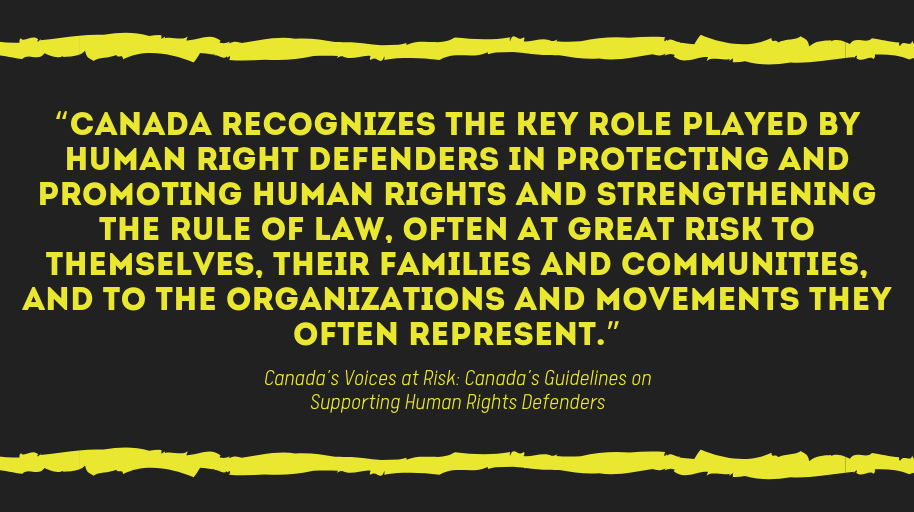With human rights defenders increasingly under attack around the world, civil society organizations today welcomed the Government of Canada’s new guidelines aimed at strengthening its approach to ensuring the safety and security of these courageous activists as part of its feminist foreign policy.
Human rights defenders are often criminalized, targeted with smear campaigns, discredited, threatened, arbitrarily arrested, and face violence because they advocate for human rights. According to Front Line Defenders Global Analysis 2018, 321 human rights defenders in 27 countries were targeted and killed for their work in 2018. More than three-quarters of these were defending land, environmental or Indigenous peoples’ rights, often in the context of extractive industries and mega projects. More than 80% of those killed had previously received a specific death threat.
Civil society organizations applaud Canada’s new guidelines for recognizing the key role that human rights defenders play in holding governments and companies to account for adhering to human right laws and standards and keeping “respect for human rights alive”. The groups also welcome Canada’s acknowledgement that human rights defenders put themselves at great risk—along with their families, communities and the movements they represent—as they work to promote human rights and strengthen the rule of law. Women and LGBTI human rights defenders, for example, face high-levels of sexual and other forms of gender-based violence because of their gender and the rights they are advocating for.
“In many parts of the world, human rights defenders are at risk as a result of their courageous work and their willingness to speak truth to power. Canada and the international community need to be strong supporters of these brave individuals. Human rights defenders must be able to act freely and without any interference, intimidation, abuse, threats, violence or reprisal. We are committed to speaking out against violations, standing up for human rights defenders and striving for a world where the rights and freedoms of all people are respected,” said Foreign Affairs Minister Chrystia Freeland today in Ottawa at a human rights event where the guidelines were announced.
For Canada’s new guidelines to be effective in helping to protect and support human rights defenders, they will need to be accompanied by a comprehensive implementation plan and increased Canadian funding going directly to human rights defenders and the movements they represent. Canada also needs to take a stronger approach to support human rights defenders advocating for corporate accountability, for instance, by enabling robust investigations when defenders face heightened risks linked to private sector investments. It will also be critically important that Canada create an advisory body that includes the participation of human rights defenders with experience and first-hand knowledge of the threats facing human rights defenders.
Canada’s new guidelines define a human rights defender as someone who, individually or with others, “acts to promote or protect human rights through peaceful means, such as by documenting and calling attention to violations or abuses by governments, businesses, individuals or groups.”
Importantly, the new guidelines call for Canadian diplomats working abroad at overseas missions or at Global Affairs Canada headquarters in Ottawa to take a more feminist and intersectional approach to promoting the rights of defenders. The document notes that many human rights defenders have multiple and “overlapping” identities, and often work on multiple issues. Human rights defenders may belong to one or more groups facing discrimination, including women, LGBTI people, Indigenous people, land and environment defenders, people with disabilities, journalists, and those seeking greater freedom of religion or beliefs. Human rights defenders in conflict and post-conflict countries face unique risks posed by high levels of militarization.
Canada’s guidelines on supporting human rights defenders were first launched in 2016.
After input from civil society, government committed to revising and updating the guidelines to best support defenders and to align with Canada’s approach to a more feminist foreign policy.
***
Quotes from Canada’s Voices at Risk: Canada’s Guidelines on Supporting Human Rights Defenders
“Canada recognizes the key role played by human right defenders in protecting and promoting human rights and strengthening the rule of law, often at great risk to themselves, their families and communities, and to the organizations and movements they often represent.”
“Canada has a strong tradition of supporting these brave people in communities around the world as they hold governments and companies to account and keep respect for human rights alive.”
“Canada’s guidelines on supporting human rights defenders is a clear statement of Canada’s commitment to supporting the vital work of HRDs.”
“HRDs help defend the vital and fundamental human rights that we all enjoy. We need to continue to be strong advocates for them.”
Endorsed by:
Amnesty International Canada
The MATCH International Women’s Fund
Nobel Women’s Initiative
Oxfam Canada
United Church of Canada
**
For more information, please contact:
Lucy Scholey, Amnesty International Canada, 613-744-7667 ext. 236, lscholey@amnesty.ca













